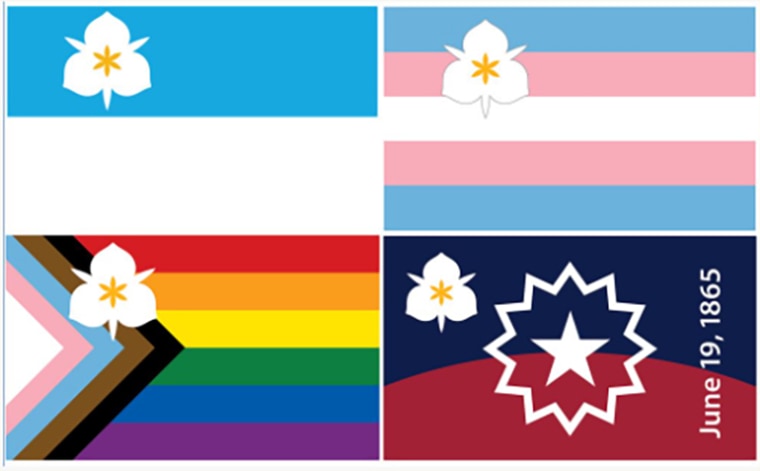Salt Lake City adopted three new city flags Tuesday, an effort to circumvent a new Utah law that effectively banned flying LGBTQ Pride and other flags at public buildings in the state.
Mayor Erin Mendenhall, a Democrat, presented the proposal to the City Council, which adopted it at its meeting Tuesday night. It incorporates the city’s flag into designs celebrating Juneteenth, LGBTQ rights and trans rights.
Follow live politics coverage here
In March, Utah became the first state to make it illegal to fly such flags at all public schools and universities and government buildings, triggering outrage among Democratic officials and civil rights groups in the state. That law prohibits unsanctioned flag displays and was widely interpreted to ban flags celebrating various communities in Salt Lake City, a blue spot in socially and politically conservative Utah.
One of the proposed flags, dubbed the Sego Belonging Flag, is intended to honor the city’s LGBTQ residents, while another, which officials called the Sego Visibility Flag, is intended to recognize the city’s trans community. The third proposed flag, dubbed the Sego Celebration Flag, is intended to honor the city’s Black residents, as well as the history surrounding the Juneteenth holiday.

“Our City flags are powerful symbols representing Salt Lake City’s values,” Mendenhall said in a statement Tuesday night. “I want all Salt Lakers to be able to look up at these flags and be reminded that we value inclusion and acceptance — leaving no doubt that we are united as a city and people, moving forward together.”
“Like other civic symbols, these flags reflect our shared humanity and the values that help everyone feel they belong — no matter their background, orientation or beliefs,” Salt Lake City Council Chair Chris Wharton added in a statement.
The state law, which is scheduled to formally take effect Wednesday, imposes a $500 fine per day on state or local government buildings that fly any flag that is not the U.S. flag, the state flag, a military flag or a flag from a brief list of exempted ones that lawmakers had approved. They include the Olympic and Paralympic flags and flags for Native American nations. Under the law, political flags were also prohibited.
Gov. Spencer Cox, a Republican, expressed concerns about the law but allowed it to take effect without his signature.
In a letter in March outlining his decision, Cox told lawmakers he agreed with the bill’s “intent” to push “political neutrality,” especially in schools, but he said it went too far in its attempt to regulate local government. He also wrote that by addressing only flags, the bill failed to take on other forms of political expression, like posters, signs and drawings.
In his letter, he also specifically addressed the “LGBTQ community,” writing, “I want you to know that I love and appreciate you and I am grateful that you are part of our state.”
“I know these words may ring hollow to many of you,” he added, “but please know that I mean them sincerely.”


Leave a Reply